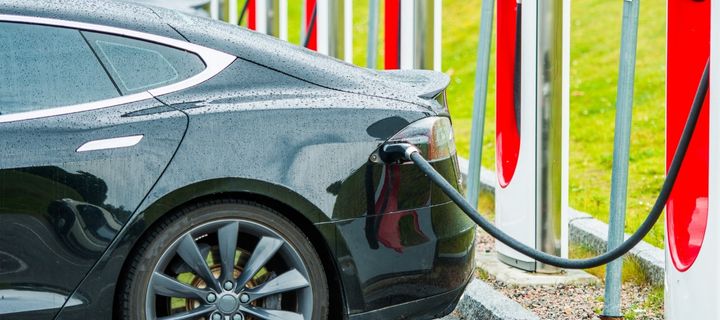
Buying an electric car, or EVs as they’re known, could save you money in the long run and reduce your carbon footprint. Every day in the UK, we see big improvements to the infrastructure needed to support EVs, including the installation of new charging points. So let’s take a look at what you need to know about buying an EV.
477,000 electronic vehicles (EVs) were registered in July 2022 (DfT)
Due to growing concerns around climate change, there’s been a steep increase in the number of electric vehicles purchased over the past few years. And along with important climate change targets, this has encouraged the Government to bring the ban on selling new diesel and petrol cars to 2030. In addition, a “significant” reduction in hybrid emissions will also be expected by this date.
There are three types of electric vehicle:
- Battery-electric vehicle (BEV) – powered purely by 100% electricity. Charged by an external power source, these models do not emit any tailpipe emissions. A single charge could give you a driving range of 100 – 300 miles.
- Plug-in hybrid electric vehicle (PHEV) – part electric with an internal combustion engine, which means it can still be driven even when the battery has depleted. Using the electric battery alone will usually give you a range of around 50 miles. But these vehicles are only efficient when charged on a regular basis.
- Extended range electric vehicle (E-REV) – a type of hybrid with a small petrol or diesel generator. Although the electric motor drives the vehicle, the engine acts as a generator when the battery has depleted. The usual range is 150 – 300 miles.
How do used EVs compare?
14.6% average growth of registrations year-on-year (DfT)
You don’t have to buy a brand-new electric car. New EVs are more costly than diesel or petrol models; a cheaper second-hand EV could be the answer. Also, V5 logbooks don’t always include relevant technical information for electric vehicles. So, if you’re considering buying a used vehicle, double-check that the model is right for your needs.
Below are a few things you need to consider before buying a used or new electric car:
- Battery sizes – can vary depending on the age and model of the car. Batteries degrade at around 2% every year; however, this will vary for used cars, depending on how the vehicle has been driven. So check the warranty (usually eight years) in case you need a replacement (if the storage capacity has dropped).
- Charging cables – check the types of charging cable and connector that comes with an electric car. Usually, you need a cable with a standard three-pin plug and a second cable called a Type 2 connector to use in public charging points.
- Driving range – this is steadily improving, thanks to improvements in battery technology. If your using the electric car for daily commuting up to 20 miles, an older EV is more than capable. However, if you’re likely to be driving long distances, then compare different makes and models.
Benefits of buying an EV
300,000 public charging points by 2030
The infrastructure for EVs is steadily improving across the UK. The Government has confirmed a new target of installing 300,000 charging points by 2030. So, buying an EV will become the norm in years to come.
There are benefits to buying this type of vehicle today, instead of waiting until it’s compulsory:
- A fully charged pure electric vehicle (EV) could give you over 200 miles of driving range. Costing around £8 – £12 to charge at home, compared to rising fuel costs.
- Pure EVs have ZERO rate vehicle excise duty, so you won’t have to pay road tax.
- If you own a business, you can achieve reduced Benefits in Kind on electric vehicles – from 2021-22, this is 1%, and from 2022-23 it will be 2%. You can also claim full first-year allowances, which means the cost of the EV can be deducted against taxable profits.
- Low or zero emissions means you will pay smaller congestion charges in clean air zones.
- With fewer mechanical components than a conventional car, there are fewer servicing and maintenance costs.
- Some towns and cities offer free parking for electric vehicles.
Two common myths about electric vehicles
- Electric vehicles produce as much carbon as diesel or petrol vehicles – this is untrue. Calculated as “well to wheel” admissions – per kilometre, petrol vehicles produce 211g, and diesel vehicles emit 179kg, while electric vehicles only produce 73g of carbon. By the first quarter of 2022, 45.5% of the total energy used in the UK was from renewables. So, going electric is a sensible option from many perspectives.
- There are not enough charging points – Nowadays, you can find thousands of charging points for electric vehicles (EVs) in every town or city. For example, supermarket car parks usually have an EV charging bay and many hotels. In addition, many large businesses, such as Next, now have onsite charging bays for employees’ EVs.
If you want to check out the potential savings on fuel and road tax by switching to an electric or hybrid car, the Energy Saving Trust has a handy electric vehicle savings calculator.
Our independent financial planners will help you plan for large purchases like a new family car. If you would like a financial review, please get in touch.
Source:
https://www.highwaysmagazine.co.uk/DfT-unveils-EV-roll-out-strategy-for-England/9614
https://energysavingtrust.org.uk/electric-vehicles-debunking-myths/
https://energysavingtrust.org.uk/advice/buying-a-second-hand-electric-car-or-van/
https://energysavingtrust.org.uk/should-you-buy-a-used-electric-car/
https://energysavingtrust.org.uk/advice/electric-vehicles/
https://energysavingtrust.org.uk/five-electric-vehicle-innovations-to-watch-in-2022/

